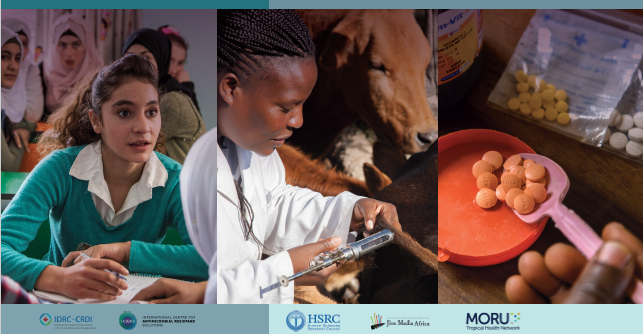ICARS and IDRC Unveil Gender and Equity-Inclusive Resource for Advancing AMR Research in Human and Animal Health
The International Centre for Antimicrobial Resistance Solutions (ICARS) and the International Development Research Centre (IDRC), in collaboration with the Human Sciences Research Council (HSRC), the Mahidol Oxford Tropical Medicine Research Unit (MORU) and Jive Media Africa, are releasing a resource document designed to integrate gender and equity considerations into Antimicrobial Resistance (AMR) innovation, intervention, and implementation research.
Integrating Gender into AMR Research with Practical Pathways
The document, titled “Practical Pathways to Integrating Gender and Equity Considerations in Antimicrobial Resistance Research,” synthesises evidence on AMR, gender, and equity from both human and animal health perspectives. Functioning as an accessible resource, it was developed in collaboration with AMR researchers and global experts, drawing on practical examples and real-world experiences to ensure maximum relevance and user-friendliness.
Practical Pathways guides AMR research teams in integrating a gender and equity lens, emphasising the necessity of such considerations in innovation, intervention, and implementation research.
The document aims to equip AMR research teams with diverse technical backgrounds to navigate intersectional gender complexities throughout the research cycle, providing practical and clearly articulated strategies. It offers a variety of pathways for fostering equitable research and developing impactful, sustainable solutions to AMR challenges.
Understanding the Intersection of AMR and Gender
AMR, a critical global threat, affects humans, animals, and the environment, particularly impacting Low- and Middle-Income Countries (LMICs) in South-East Asia and Sub-Saharan Africa. These regions report the highest death rates from drug-resistant infections. Gender, alongside other social, cultural, and biological factors, can influence one’s vulnerability to AMR. For example, different social characteristics may impact one’s exposure to resistant microbes, access to treatment, antimicrobial usage, as well who in a community may most benefit from mitigation strategies. Practical Pathways aims to help researchers fill the gap, since existing research often overlooks these complexities, focusing primarily on biological sex and neglecting critical gendered and intersectional factors.
Download and Engage: Toolkit Access and Webinar
Practical Pathways is available for download here. To facilitate understanding and application, a webinar on integrating the resource into AMR research projects will be held on Dec 7, 2023 02:00 PM CET. Secure your spot by signing up here.
About
ICARS
The International Centre for Antimicrobial Resistance Solutions (ICARS) is an independent, self-governing institution working internationally in partnership with LMIC governments to co-develop and test cost-effective, context-specific solutions with the potential for scale-up and sustainable impact across the One Health spectrum.
IDRC
As part of Canada’s foreign affairs and development efforts, IDRC champions and funds research and innovation within and alongside developing regions to drive global change. They invest in high quality-research in developing countries, share knowledge with researchers and policymakers for greater uptake and use, and mobilise global alliances to build a more sustainable and inclusive world. This work was supported by InnoVet-AMR, a partnership between IDRC and the United Kingdom Government’s Global AMR Innovation Fund (GAMRIF), part of the Department of Health and Social Care. InnoVet-AMR funds research on new vaccines and other antibiotic alternatives to reduce the emerging risk that AMR in food-producing animals poses to global health and food security.
HSRC
As the national social science council of South Africa, the HSRC serves as a knowledge hub to bridge the gap between research, policy, and action; thus, increasing the impact of research. This is achieved through collaboration with key constituencies, including government, other research organisations, multinational agencies, universities, non-government organisations, and donor and development organisations.
MORU
The MORU Tropical Health Network, which hosts the ‘Thailand Wellcome Africa and Asia Programme’, conducts targeted clinical and public health research that aims to discover and develop appropriate, practical, affordable interventions that measurably improve the health of people living in resource-limited parts of the world.
Jive Media Africa
Jive Media Africa is a specialist research engagement agency, working with top researchers and practitioners to showcase their inspiring work, translating it into engaging and accessible media. Jive’s work enhances the positive impact of research through skills development, media production and public engagement.

